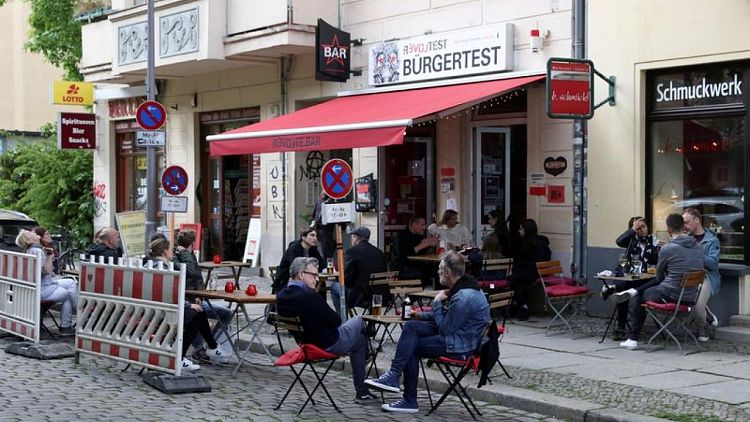By Kirsti Knolle and Caroline Copley
BERLIN - German business morale fell unexpectedly in July on continuing supply chain worries and amid rising coronavirus infections, a survey showed on Monday, the first decline since January.
The Ifo institute said its business climate index fell to 100.8 from a revised figure of 101.7 in June and versus a Reuters poll forecast of 102.1.
"Supply bottlenecks for preliminary materials and concerns regarding a renewed rise in (coronavirus) infection numbers are weighing on the German economy," Ifo President Clemens Fuest said in a statement.
Companies gave a slightly better assessment of their current situation but optimism with regard to the coming months waned.
The Ifo expectations index fell to 101.2 from 103.7 in June, while the current conditions index rose to 100.4 from 99.7.
Almost 64% of industrial firms in Europe's biggest economy complained about bottlenecks in supply chains, while 60% of wholesalers and 42.5% of retailers also reported shortages, according to the institute.
"Nerves are on edge again," said Andreas Scheuerle, economist at Dekabank. "The first drop in the Ifo business climate came faster than feared."
Events including the COVID-19 pandemic, natural disasters in China and Germany and cyber attacks have conspired to drive global supply chains towards a breaking point, threatening the flow of raw materials, parts and consumer goods.
"The expected straight-line economic recovery in the second half of 2021 is not a foregone conclusion," Bankhaus Lampe chief economist Alexander Krueger said.
Supply chain disruptions are likely to persist and economic recovery will continue to depend on the pandemic, Krueger added.
Germany's car industry - featuring powerful brands like Volkswagen, Daimler and BMW and accounting for an estimated 5% of the economic output and more than 800,000 jobs - this month slashed its forecast for 2021 production growth in response to the insecurities.
The flooding in western Germany two weeks ago is likely to add to the problems, and road transportation of goods has slowed significantly. In the week of July 11, as the disaster unfolded, the volume of late shipments rose by 15% from the week before, according to data from supply-chain tracking platform FourKites.
In Germany's tourism and hospitality sectors, among the worst hit by lockdowns, euphoria has also ebbed, with many fearing a fourth wave of the coronavirus, Ifo economist Klaus Wohlrabe said.
After more than two months of steady decline, COVID-19 cases have been rising since early July, due mainly to the spread of the more infectious Delta variant.
Roughly 60% of Germany's 83 million people have had a first shot of a COVID-19 vaccine and about half are fully vaccinated.
($1 = 0.8488 euros)



